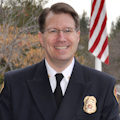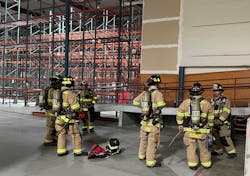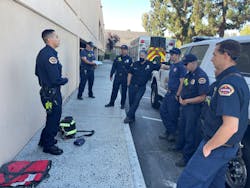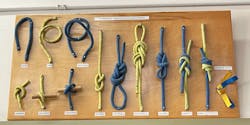The Fire Officer’s Role in Training and Mentoring
When I start many of the sessions on leadership and officer development that I present, a question that I like to ask is, “What is the most important/critical role of today’s officer?”
The answers usually include: “Ensure everyone goes home”; “Take care of our personnel”; “Take care of the public”; “Enforce policies”; “Be a leader”; and “Solve problems.” None of those are wrong answers, because all of them are within any fire officer job description. All of these roles are undoubtedly important.
Obviously, the number one reason why we serve in the fire service is to serve the public. Thus, taking care of the public and attempting to solve their problems should be of the utmost importance. If you aren’t meeting their needs—and, sadly, that has occurred in various fire departments across the country—don’t be surprised when there’s a public outcry to “defund the fire department.” Think I’m joking? Ask a taxpayer whether he or she will question why members of their fire department are getting so many tax dollars if the members aren’t going to risk their life to try to save their family in their time of need.
What’s most critical?
It wasn’t until I heard my former department’s former fire chief, Tony Bowden, say it to a group of newly promoted captains that it hit home. We hosted an academy for newly promoted captains, and he asked them the same question: “What is the most important/critical role of today’s officer?” Many of the same answers that I shared above were called out. After that, he stated something along the lines of, “Your most important role is to train and mentor your personnel. If they aren’t prepared to do their job, your job or other jobs that they might be asked to do in the future, then you failed.”
If you think about it, training and mentoring personnel covers all of those other answers and then some. If your personnel aren’t trained or mentored properly, how can you expect them to be safe? How can you expect them to take care of business when the bell goes off? How can you expect them to do their job both now and in the future?
Now, if you think that I’m putting us ahead of the public, I’m not. The public always should be number one. However, if your personnel aren’t trained or mentored properly, how can you expect them to be there for the public?Best practices
If you’ve been in the fire service long enough, you were exposed to many different fire officers. Some of them probably were great at training and mentoring, and some weren’t. Some probably were “retired in place” and just calling it in, doing nothing, or just checking the boxes when it came to training and mentoring.
All fire service personnel should be fortunate to have a supervisor who always is focused on training and mentoring them, not just for today, but for the future, too.
Below are seven best practices that are related to training and mentoring personnel:
Ensure that crewmembers are ready to handle “it.” “It” covers any type of response or situation.
Don’t expect your training officer to provide or direct all of the necessary training and mentoring. As the officer, you are the one who ultimately is responsible for ensuring that your crews can handle virtually anything that they might face, including knowing their apparatus inside and out, which includes how to operate and maintain the apparatus and all of the tools and equipment that are found within.
Get to know members’ strengths and weaknesses. This is done through training, particularly hands-on training, and lots of time talking, listening, and getting to know them, their families, their likes and dislikes, etc., whether that be at the kitchen table, around the firehouse, on the training ground, on the emergency scene or off duty. Take the time to maximize those strengths and to assist with improving those weaknesses.
A successful team solves problems by capitalizing on the strengths of its respective members. Good leaders and officers know their personnel so well that they assign their personnel to the right tasks at the right times.
Find out members’ career goals. Some personnel have no desire to promote, and that’s fine, because we need great people at all ranks. Also, not everyone is meant to promote or should promote. However, this doesn’t mean that those people can’t strive to be better and to be the best that they can be.
For those who have the desire to promote or who take on various special assignments or projects, take the time to expose them to your job, to point them in the right direction, to be a resource and be the one who they can say helped them be successful.Know your resources within and outside of your department. Nobody is an expert at everything, nor does everyone have all of the answers. Still, a good officer is someone who isn’t saying “I don’t know” all of the time. Although you can’t know everything, you should be able to at least point people in the right direction if you don’t have the answer.
Although it’s great to encourage personnel to be resourceful and to do their own research, it also is great to be able to coach them and guide them when appropriate. You also will learn something in the process, and they will feel that you are showing an interest in them.
This also includes knowing the personnel who can help you to help others.
When working a 24-hour shift, two hours of training and mentoring should be the minimum. Now, if you’re running 10–20 calls per shift, this might be a challenge, but it can be done. Not every company can carve out a two-hour block each shift and have zero interruptions. I get it. Some might say that they must go out of service to train, because the goal of covering the station’s response area must be remembered.
Yes, there might be an occasion when you’re dropping hose or have ladders extended and you have a delayed response. There might be a time when mandatory training might require a move-up company or your area to be covered by the next due company. However, those should be the exceptions rather than the rule.
Good officers know that two-hour blocks are unrealistic, so they must get creative in their training and mentoring. They might not even get one uninterrupted hour. Some of the best officers I worked for as a firefighter started the training and mentoring at the kitchen table while we had breakfast, spending 15–45 minutes discussing current or past events and best practices, sharing articles from Firehouse Magazine or the internet, etc. They then took 15–45 minutes before, during or after going shopping or conducting other business, such as doing area familiarization, doing a preplan, or discussing strategy and tactics while driving around or while in the store itself.
If you have a company of four or more personnel, not everyone needs to go into the store.
(Note: I’m a fan of two going into the store, as I was guilty of missing a call because my radio was off or low, but thanks to the radio of another firefighter being on, we weren’t delayed.)
If two go in—and, particularly, if you have a new firefighter—the firefighter who stays outside could be quizzed or be asked to give a class on the tools and equipment that are on the apparatus. Even a fire prevention inspection isn’t about checking the boxes for compliance. It’s about discussing strategy and tactics, looking for potential challenges or issues, etc.
Get them out of their comfort zone. Some of the best training and mentoring that I received occurred when my officers challenged or encouraged me to step up, learn more or learn something new, particularly when I might not have been feeling ready or inspired to train or grow.
Don’t let training take a holiday. It’s very easy to get complacent and to believe that you don’t need to train because you run calls.
What’s the old saying? “How many hours of practice before we master something?”
Emergencies can happen in all types of weather and conditions, so don’t let days that end in “y” or weather cancel training and mentoring. Find a way to make it work.
No time like the present
Training and mentoring your personnel to step into future promoted ranks or to just be the best that they can be in their current rank can’t happen enough. If there was ever a time to train your replacements for when it’s time to pass the baton, it’s now. The personnel who we hire today are the leaders of tomorrow.
About the Author

Steve Prziborowski
Steve , a 33-year fire service veteran, recently retired as a deputy chief with Santa Clara County, CA, Fire Department. He is an Instructor for the Chabot College Fire Technology Program, the National Fire Academy, and is actively involved in the fire service speaking, writing and mentoring personnel aspiring to get hired or get promoted to all ranks up to fire chief. Prziborowski is a contributing editor to Firehouse Magazine and received the 2020 Ronny Jack Coleman Leadership Legacy Award from the Center for Public Safety Excellence (CPSE). He has a master’s degree in emergency services administration and has completed the Executive Fire Officer Program at the National Fire Academy. Steve is a regular speaker across the country, having presented leadership and career development sessions in 40 states, moving closer to reaching his goal of speaking in all 50 states.
He has authored/contributed to articles, podcasts, videos, and books in the leading fire service publications, and has authored five career development books: “Courage Under Fire Leadership," “101 Tips to Ace Your Promotional Exam,” “Reach for the Firefighter Badge,” “The Future Firefighter’s Preparation Guide,” and “How to Excel at Fire Department Promotional Exams.” His YouTube channel has over 200 videos to help those getting hired into the fire service as well as those aspiring to promote to all ranks up to fire chief.
For more information or to reach out, please go to: www.code3firetraining.com


